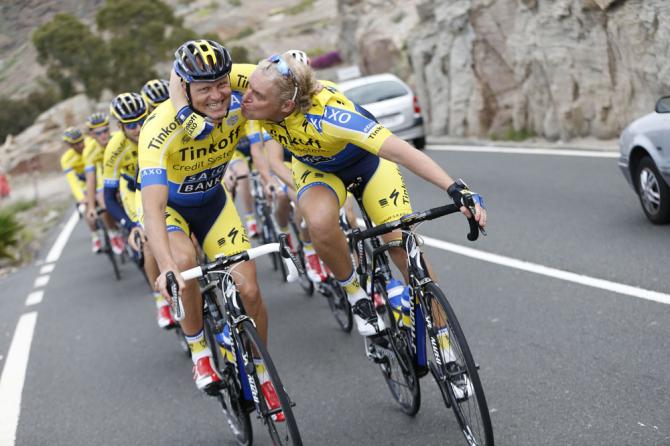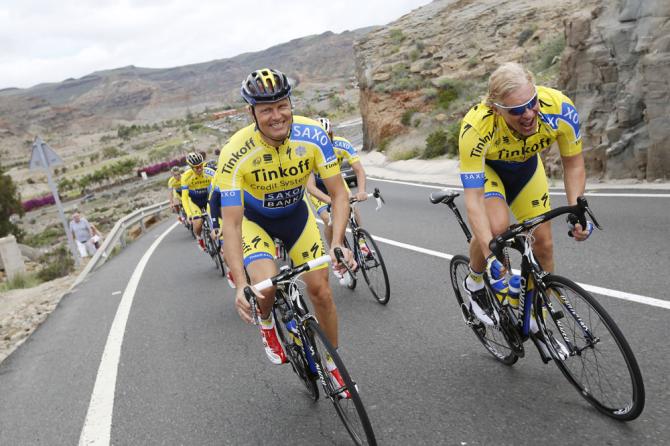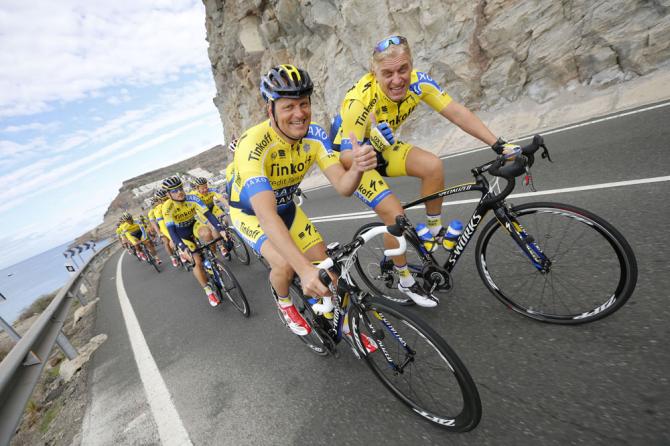Tinkov: We could boycott the Tour unless we get a share of TV revenue
Tinkoff-Saxo team owner explains how he wants to change the cycling business model



Oleg Tinkov is proud to be a self-made man after creating a series of businesses and then selling them for a profit. Now he wants to use his business instincts to revolutionise the way professional cycling is managed. He wants the major race organisers to share their TV revenue to create a more stable team structure.
In the second part of an exclusive interview with Cyclingnews after a training ride with his Tinkoff-Saxo team in Gran Canaria, Tinkov explains what he thinks should be done.
He's ready to challenge ASO for a share of their TV rights income, jokes about kicking Team Sky's ass and about his own ego. But he is very serious about shaking up professional cycling and making Tinkoff-Saxo into the best team in the peloton.
Read part one of the exclusive interview here.
Cyclingnews: You're a successful businessman, who likes cycling and has invested in it. What do you think should be done to improve it?
Oleg Tinkov: I like to do simple things in business and in cycling too. People are talking about the doping problem, the lacking of sponsors and the lack of professionalism. But at the end of the day, it's very simple: Cycling needs to change its business model. If teams always depend on just sponsorship, things aren't going to get better.
Now people like me, other wealthy guys and governments like in Kazakhstan and Russia are starting to pay the bills. That's better than a full commercial sponsor.
Get The Leadout Newsletter
The latest race content, interviews, features, reviews and expert buying guides, direct to your inbox!
CN: But is that fair? How can teams that only have commercial sponsors like Garmin-Sharp or Lotto-Belisol compete against teams backed by wealthy team owners?
OT: Maybe it's not fair but it's the market. I don’t believe in Jonathan Vaughters’ model. He's a poor guy. He's stuck. At some point he will need to sell the team. I respect Vaughters, I respect Patrick Lefevere at Omega, I respect Unzue at Movistar, they're great sports directors, like Bjarne [Riis] is. But they deserve an easier life and somebody to pay their bills.
I'm not accusing anyone but the purely sponsorship model doesn't work. They need to deliver results to secure their sponsorship and so perhaps some of them closed an eye to doping. That creates a vicious circle: If they don’t get the results, they can't find a sponsor and then the team quickly collapses.
When there's an owner like myself behind the team, it’s better. I said no to doping. The riders and sports directors know that I'll pay the bills and so don't have to worry. It's still not a perfectly healthy business model. The perfect model is one where it's 50-50: 50% from sponsors and 50% from other revenue such as TV revenue. Teams need income and at the moment there's no income for the teams. And TV rights are the biggest source of income.
RCS Sport, ASO and others like Flanders Classics, they need to start paying the teams. The sooner it happens, the better it will be for cycling. We're moving forward with Sky's business approach and the arrival of [Fernando] Alonso will be good too. We've also got a new UCI President in Brian Cookson, which is good. I'd like to meet him at some point and talk about things. He's seems a good guy and a smart guy. He should take the lead and push the race organisers to share the TV revenue.
CN: The organisers say they wouldn't make any money without retaining the TV rights.
OT: (Laughs) Right. It's not a secret that the Tour de France makes hundreds of million of Euro a year. They have money.
I think we can compare it to a theatre. When you go to the theatre and buy the ticket, you expect the actors are paid for their performance. But when you watch a Grand Tour like the Giro, the Tour or the Vuelta, the actors aren't getting any of the revenue, the teams aren't getting a share of the TV revenue.
CN: But ASO owns the theatre that everyone wants to perform in and see.
OT: Yeah but if the actors go on strike, there's no show…
CN: Could it go that far? Could the best teams boycott the Tour de France?
OT: Why not? If ASO doesn't share their TV revenue, we could boycott the Tour de France.
CN: But team sponsors get 80% of their visibility at the Tour de France.
OT: But now we have owners like me, Andy Rihs at BMC, [Igor] Makarov at Katusha and others. Now we can afford to miss two or three editions of the Tour.
CN: That's not making a deal, that's starting a war.
OT: No. We're not saying, ‘give us all the money.’ It's a win-win situation, for us and for them. If they don’t share, it's not going to work for them anyway.
If a lot of the big teams decide not to go to the Giro and the Tour, what are the organisers going to do? Before, the commercially sponsored teams could not afford to miss the Tour de France. Now we can. What are they going to do if we say we won’t ride unless they pay us? (Bangs a finger on the table).
How can they perform without the leading actors? With student actors? With small French teams? The people won't pay the ticket for the show. So they're bluffing.
I'm sure we'll change things. We're not against ASO, they need to understand the benefits of change too. The teams would be stronger and there would be no scandals and no doping either. We would all benefit.
Who is Oleg Tinkov?
CN: I'd like to ask some questions about you. You don’t seem afraid to speak your mind, in interviews like this one or on Twitter.
OT: Why should I be? I'm not a politician. I'm just a human being who says what he thinks. I don’t think there's anything wrong with that.
CN: Are you concerned what people say about you?
OT: Not really. People can say what they want. I'm used to it. I only care what my wife and kids say, not what people I don’t know say. Especially on Twitter. When people say I'm an idiot on Twitter I often re-tweet it.
CN: Do you think people really understand what you are like?
OT: Even I don't understand who I am… I've said that Twitter is my alter-ego and so I'm already stuck trying to understand who the real Oleg Tinkov is, who is my ego, and who is my alter-ego (laughs). Even I don’t understand who I am.
For sure I don’t take myself too seriously and so I hope other people don't take some of the things I say too seriously. However I'm serious when it comes to business and winning races.
CN: You clearly have some talent for business. Is it true you started by selling jeans?
OT: Yes. I have a book that tells my story. It's been translated in English too. It's called 'I'm just like anyone else.' You can download it on Apple iTunes.
I'm from Siberia and so when I was 13 we went to Uzbekistan to go training in better weather. It's hot there and so nobody wears jeans, and they're Muslim too. There was a general Soviet distribution of goods and I remember there were Montana and Rifle jeans. In Uzbekistan, they cost 50 rubles but on the black market in Siberia, they were worth 100 rubles. So me and my friends were smart enough to collect some money together. I borrowed some from my parents and neighbours, and bought a lot of jeans. It was illegal back then to speculate like that but we hid them in our bike bags and brought them back to Siberia.
I started to be a businessman because of cycling. I was able to travel a lot in the Soviet Union to go to races and so we bought more stuff, from foreigners too. They sold me water bottles for 10 rubles and I sold them at my club for 30 rubles. Then I sold jerseys and shorts. All of the athletes did that, they bought lots of stuff when they went to world championships and the Olympics. A lot of Russian business people came from sport.
I was a good rider, I was a sprinter and won something like 40 races. I was also the champion of Siberia. I did my military service but they didn’t take me at the Army sports team, instead they sent me to immigration and gave me a big Kalashnikov. I was in the army for two years and didn’t continue racing after that, so I went to St. Petersburg and studied mining at university.
While there I start my dealing again with the foreign students. Then I built my electronics business, flying to Dubai and Singapore to buy electronics, video players and computers. I built the biggest electronic retail chain in St Petersburg. I sold it and then created Daria – named after my daughter – and it became the biggest frozen food company in Russia. I sold that to Roman Abramovich for 20 million and invested in creating my Tinkoff beer brand, and six years later I sold that to InBev for 200 million. Then I created the bank and recently did an IPO and the company is now listed on the London Stock Exchange and worth a fortune.
It's as simple as that. And now I'm trying to build the best cycling team in the world with Stefano Feltrin, the CEO of the team, with Bjarne Riis, the sports director and some other great people. We want to take on Sky and kick their ass (laughs).
Of course, I mean in a sporting context. I want to get on with everyone. I don’t want to a war with Sky, with Katusha, with Astana. They're my colleagues now.

Stephen is one of the most experienced member of the Cyclingnews team, having reported on professional cycling since 1994. He has been Head of News at Cyclingnews since 2022, before which he held the position of European editor since 2012 and previously worked for Reuters, Shift Active Media, and CyclingWeekly, among other publications.